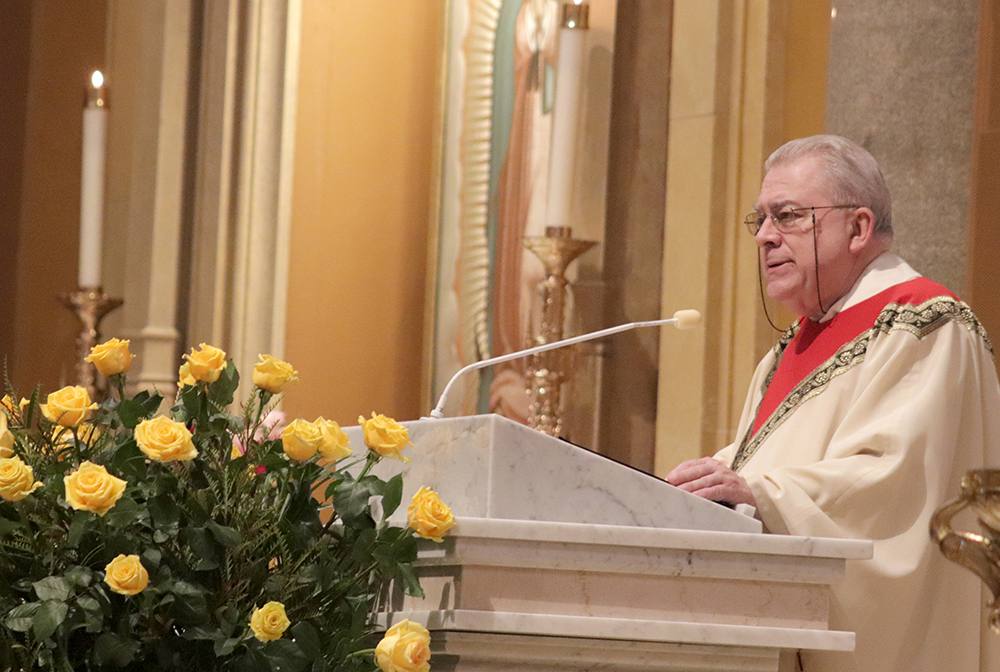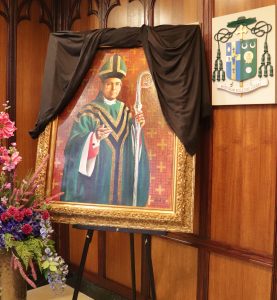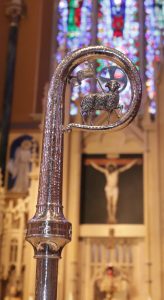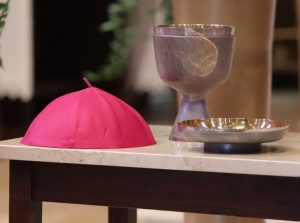Funeral homily: Three things that Archbishop Myers would say to us today

Msgr. Steven P. Rohlfs, PA, who was vicar general to Archbishop John J. Myers when he was bishop of Peoria, was the homilist for the Solemn Requiem Mass on Sept. 30. His memories offered a humorous and touching look at how Archbishop Myers loved his priests and the church. (The Catholic Post/Jennifer Willems)
EDITOR’S NOTE: Following is the full text of the homily given at the Sept. 30 Requiem Mass for Archbishop John J. Myers. The homilist was Msgr. Steven P. Rohlfs, rector emeritus of Mount St. Mary’s Seminary in Emmitsburg, Maryland, and a longtime friend of the archbishop who served with him in the Diocese of Peoria, including as vicar general.
—
When Sir Winston Churchill died in 1965 his state funeral, which took place in St. Paul’s Cathedral in London, was broadcast all over the world. Churchill had meticulously planned the symbolic elements of his funeral to speak to all those who would attend it in person, via radio or television. He wanted to make sure that the hundreds of millions of people somehow present, received one last message from him as he departed this world.
Perhaps the most poignant part of the funeral came at the very end. After the final prayer and before the coffin was carried out of the church for the last time, the Archbishop of Canterbury called for a moment of silence. After about 30 seconds, two state buglers — high up in the great dome of St. Paul’s Cathedral — appeared. The first bugler intoned “the Last Retreat.” This was the universal signal used in all the British and Commonwealth encampments around the world that the battles of the day were over. The men could now rest and sleep.

A portrait of Archbishop Emeritus John J. Myers of Newark, draped in black, was placed next to his episcopal motto, “Mysterium Ecclesiae Luceat” (“Let the Mystery of the Church Shine Forth!”), in the narthex of St. Mary’s Cathedral, Peoria. (The Catholic Post/Jennifer Willems)
But then, just as Churchill had instructed, as soon as “The Last Retreat” was finished, another bugler, also in the great dome, immediately intoned the notes of “Reveille!” — the universal signal to get up, the day is at hand! This was Churchill’s final symbolic words to the congregation. As a Christian, he believed in the resurrection and eternal life. He knew that the worst things are never the last things and that the eternal day always follows the night of death.
HE WAS A REALLY GOOD BISHOP
We gather here this morning to say our goodbyes to Archbishop John Joseph Myers — Bishop, priest, scholar, teacher, brother and friend. He lived a decently long life — we often forget that he was close to 80 years old. A fairly successful life, and until the last few years a happy one.
I think all of us who knew him well, or even occasionally, will remember him as a truly decent, honorable Christian who fulfilled the various roles in our lives “pretty well.”
In the days after someone dies, their family and friends have a tendency to easily use superlatives in a way which glosses over the humanity of the person and which everyone who speaks the words and hears the words knows is not precisely true.
Rarely is anyone “the best” at anything — be it the best Bishop, the best priest, the best teacher, the best brother, or the best friend. I think it best on occasions such as this to give a more honest and believable assessment. To do so is I believe more accurate, and in the end I think is much more complimentary.
So if you ask me if the Archbishop had all of the qualities necessary to be a good Bishop — was he a man of faith and prayer, was he honest, fair, merciful, just, tolerant, funny, discreet, a good mentor, teacher and example? — I would immediately answer “Yes!”
Was he the best Bishop? No. But nor do I think any of us ever expected him to be “the best Bishop.” I don’t think any of us have ever met “the best Bishop.” No offense. (Laughter) There could be one here, he just has not emerged yet. (More laughter.)
Without a doubt I can say in answer to the question “What kind of Bishop was he?” that “You know, he was really a good Bishop.” And I honestly think that no matter what role the Archbishop played in each of our lives, all of us could probably say the same thing. “He was really pretty good!”
I don’t think any of us would believe the assessment that we are the best at anything — but I do think that each of us would be very pleased if we honestly thought we were “really pretty good” at something.
THREE PERSONAL STORIES
On occasions such as this one always gets to remember a few stories. It extends the homily but I think it’s worth it.
Archbishop Lori had assured the prelates looking at the Danish this morning, “Don’t worry, Msgr. Rohlfs is preaching, there’s no need to worry about the eucharistic fast.”
Just three little stories.
One I remember on the day of his ordination as bishop and his father made the great prophecy: “John, the further up the ladder you go, the more of your rear end there is to kick.” The bishop laughed at it, but as the years grew on, it truly was a prophecy.

Resting in a stand near the casket of Archbishop Emeritus John J. Myers was his crosier, a gift for his consecration as coadjutor bishop of Peoria on Sept. 3, 1987. It was given to him by Father Joseph Boylan, now deceased, who was a “dear friend.” (The Catholic Post/Jennifer Willems)
Then there was the time he taught me the urge that he had for self-preservation. The cook was gone for two weeks and he asked me would I cook? I knew he was a farm boy and so I fixed him all the various farm foods that he enjoyed. We lived together off and on for about 25 to 30 years. That night he came down and he said “What’s for supper?” I said buttermilk fried chicken, buttermilk mashed potatoes, cream gravy, corn on the cob with real butter, strawberry shortcake with real whipped cream.
He said “Just a second” and he left the table and went upstairs to his room. And he came down with a pillow. I said “Why do you have a pillow,” and he said, “After I eat this lovely meal I’m going to smother you.”
He said “I want to live at least a few more years and with you cooking it’s not going to happen. So while I’m eating you make an Act of Contrition and then we’ll meet up.”
And then finally one last little story, humorous but poignant. When I was his vicar general I would be with him when we had to have serious meetings with various people. This one particular priest, who is long dead now, had been called in because he wasn’t exactly following the line the bishop wanted him to follow.
The Bishop said “Have you talked to him?” I said “Yes. But this one can only be cast out by prayer and fasting, so you need to see him. Bishop you’ve got to be firm with him. He might listen to you if you’re firm.”
It was December. I stayed as a witness.
At the end of it the priest knelt for his blessing and off he went.
I shut the door and we always debriefed after such meetings. The Bishop said “How did I do?”
I sighed and said: “Bishop, you might as well have had him crawl up on your lap for the Christmas picture! This isn’t Santa’s hut!”
He said “I know. I just can’t do it. A man ought to love his Bishop. They already hate you, you’re the Vicar General. They’re supposed to love me.” And we all had a laugh with that.
Afterward the poignant thing was he wrote a little note and he said, “Don’t forget this. Call this priest tonight.” I said “Who’s this?” He said “I think that’s father’s spiritual director. I think he’s suffering after this meeting. I don’t want him to suffer alone.”
He always had the care of the priests in his heart.
I could go on and on with such stories but I want to save some time for the Archbishop to say a few words to us this morning.
WHAT ARCHBISHOP MYERS WOULD SAY TODAY
You know the Irish always believed that God would allow us to attend our own funeral if we so wished. And I know he would want to be here if he could. You could see who was there, what they said, how they reacted, etc.
So I think this morning that the more important points are not what we would say about the Archbishop, but what he would want to say to us — now — if he had the chance. Not what would he have said to us five months ago, five years ago or even five weeks ago, but what would he want to say to us now — knowing what he knows now, seeing who he sees now. What would he say to us now?
With the clarity of his vision now, the Archbishop would want to remind each of us that the purpose of this world is not to amass wealth or power or influence. It is much more profound than that. The purpose of this world is to learn how to love on earth the way they love in heaven — and to begin to love other people the way God has loved us.
We know in faith that now he is somehow with the Lord in Eternity, that he is able to see things more clearly, that he is able to see things as God sees them — the way they really are — for as C.S. Lewis says, he is now in the really real world of Eternity.
It is our deepest belief as Christians that death is not the end but only the beginning of the ultimate and never-ending stage of our lives. And so I deliberately refer to the Archbishop in the present tense because he is still very much alive and existing in eternity.
When we attend funerals each of us in some way confronts and reflects on our own mortality. It is not lost on those of us gathered here this morning that each of us will die and each of us will have a funeral. The circumstances of this day inevitably lead us to ponder this future reality — and I think we all wish that those who have gone before us into Eternity could share with us some wisdom and insight on such an occasion.
And so once again I pose the question: What would the Archbishop want to remind us about this morning?
I think he would remind us of three things.
OUR PURPOSE IN THIS WORLD
First, he would want to remind us of the necessity of seeing our life as a whole and seeing it in context. Human life has three stages — the first is the nine months that each of us spend in our mother’s womb. The purpose of this stage is fairly obvious — it is to develop physically to the point that we can exist in the real world.
At the end of nine months, much to the relief of our mothers, we are forced to leave that world and are literally pushed into the real world. As this happens to us we are scared to death. We don’t understand what’s going on — lights, water, suction, smacking, crying, etc. But after a while, we settle down, and after a few years of maturity we realize that we were indeed foolish to think that our mother’s womb was the whole world.
But at this point we begin to ponder another question. What is this world all about? What’s the purpose of this world?
With the clarity of his vision now, the Archbishop would want to remind each of us that the purpose of this world is not to amass wealth or power or influence. It is much more profound than that. The purpose of this world is to learn how to love on earth the way they love in heaven — and to begin to love other people the way God has loved us. This world is not the end. It is simply the second-but-essential womb. Just as we existed for nine months in our mother’s womb, so we exist nine decades or so in this world until at death we enter into the really, real world of Eternity.
He would want to remind us that shortly after we die we somehow encounter God in what the Church calls the Particular Judgment. I believe that God simply asks us one profound question: “Do you love Me more than anyone or anything else? And have you loved other people the way I have loved you?”
The sticking point for each of us will be that little word “more.” Most of us try to love God — just not more than anyone or anything else. Therein lies our problem. It’s not that God would not want us to be in heaven with Him. It’s simply that we wouldn’t be ready for it. We wouldn’t be comfortable being with Him. For heaven is a person much more than it is a place. What makes heaven heavenly is the fact that God, who is the center of our life, is there. Once we truly understand this, we spend the rest of our life preparing for it. The problem comes when we don’t truly understand that and we live a wasted life.
DEVOTE YOURSELF TO THINGS OF HEAVEN
The second point I think the Archbishop would want to remind everybody about is this: Make sure you devote yourself and your life to things that really mean something in the really, real world of Heaven. In other words, don’t devote yourself to things that nobody cares about in eternity. No one will care how famous we are or how powerful we are or how much money or influence we possess. These things may be nice but they are ultimately not important.
Remember the great question that each of us will be asked by our Heavenly Father: “Do you love Me more than anyone or anything else?” To show him our bank accounts, our titles, or our resumes will simply make us look foolish! Nobody cares about those things in the really real world of heaven!
I know he would want us to remember this today.

The zucchetto, chalice and paten of Archbishop Emeritus John J. Myers rests on a table near his casket at St. Mary’s Cathedral in Peoria on Sept. 29. The chalice and paten were gifts from his parents, Jack and Margaret Myers, for his ordination to the priesthood on Dec. 17, 1966, in Rome. (The Catholic Post/Jennifer Willems)
Finally, I think that the Archbishop would want to remind us that he will see us again. God is taking care of him, he is with all those who loved him and have gone before him. He still knows us, still loves us, and still cares about us. He will pray that each of us will see things the way God sees them and lead our lives in the realization that we are meant for the really real world of heaven.
The way he communicates with us will be much more mysterious now — through memories recalled, interior reminders, subtle insights — but communicate he will. We shall simply need to pay closer attention to how he speaks to us.
THE ARCHBISHOP HAS “ARRIVED”
So there are three things I think he would want to remind us about this morning.
- Make sure you understand the true meaning of life — this world isn’t it.
- Make sure you devote yourselves to things that make a difference in the really real world of Heaven. Don’t devote yourself to fool’s gold, and
- Don’t worry about me. I’ll see you again. And then there will be no more goodbyes after that.
The ancient Christians in Asia Minor had a much more beautiful way of speaking about death than we do today. They didn’t speak about death as “departing” but as “arriving.” On their tombs they would often write Thomas or Paul “has arrived.” It was to this reality that Churchill tried to speak at the end of his funeral.
And so this morning we celebrate the fact that the Archbishop “has arrived.” And he was a firm believer in Purgatory. So in case he’s not quite in Heaven yet, he would want everyone to pray for him. But I’m rather confident he’s pretty close. And the reason I’m confident about this is that so many who truly knew him, including I think the Lord, would honestly say about him “You know, he was a good Bishop.”
I know he would be pleased by that.
And so, Your Grace, may the angels lead you into Paradise. We shall pray for you and never forget you! We ask that you do the same for us until we all meet in that realm where there are no more goodbyes but only sheer joy in the presence of the One who called you to be a good shepherd to his sheep. And John, you truly were that. You were a good shepherd.
Farewell, Your Grace, until we meet again.





